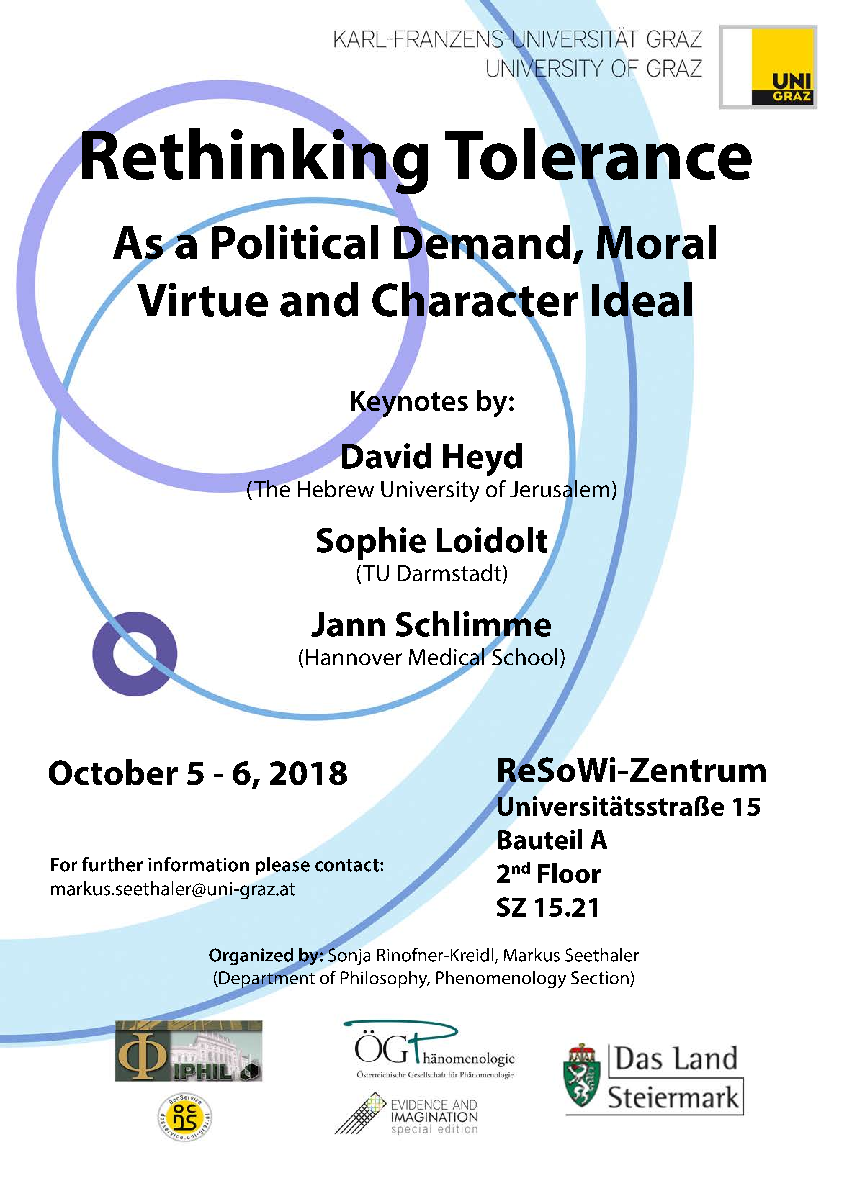Venue: SZ 15.21, (Universitätsstraße 15, Bauteil A, 2OG)
It is a declared objective of all western democracies to foster a thriving communal life of human beings from different social milieus and with various ethnical, ideological, political or cultural backgrounds. While it seems impossible to avoid conflict in such a pluralistic society, it is part of every liberal approach, and of culture generally – at least since the Age of Enlightenment – to deal with such conflicts and disagreements on the basis of some jointly recognized minimal rules and value commitments. A significant aspect of this cultural heritage is the idea of toleration. Indeed, the idea of tolerance is key, as it answers to a fundamental sociopolitical issue arising directly from the endorsement of cultural diversity: how should we deal with “others” and “otherness” in a civilized and peaceful way?
Usually, the notion of toleration is understood either as a political demand or as a moral concept (or both). While the political dimension is most widely acknowledged, tolerance as a moral concept seems less clear and more controversial. The central aim of this conference is to clarify the notion with a special focus on its moral dimension. Taking account of the non-ideal circumstances of everyday life, this should also include scrutinizing pathological aspects of behavior which effectively weaken or abolish human agents’ capability to act in accordance with the idea of toleration. Furthermore, if tolerance in general is about how to deal with others and otherness in a decent manner, then it is reasonable to ponder how the difference between “normal” and “non-normal” variants of otherness manifests itself with regard to the prospects of living together in tolerant ways. From this perspective, tolerance presents itself as a thick concept embedded (or even entangled) in different aspects of a collectively shared form of life which remains hidden, so to speak, as long as its “sharedness” is taken for granted. It is therefore not surprising that issues of pathological otherness at once demand an exploration of and pose a challenge to those deeply entrenched, yet historically and culturally varying ideas of human nature that lie beneath our talk about tolerance and tolerant patterns of behavior. Hence, by looking at phenomena of otherness, one can hope to figure out how certain anthropological ideas, social conventions, as well as moral and political demands interlock in shaping our notion of tolerance. Accordingly, it can be assumed that any sustainable understanding of the notion of tolerance will benefit from interdisciplinary and cross-sectional investigations.
As mentioned, however, this conference intends to elaborate on the notion of tolerance predominantly in view of its moral aspects. Suitable questions for doing so may comprise the following:
- Is the concept of tolerance (solely) meant to tackle cases of deep disagreement between opposing views? How are the epistemological questions concerning the justification of tolerance linked up with its social and moral aspects?
- What does an adequate definition of “tolerance” look like? How is it related with similar notions like, for instance, appreciation, recognition or (self-)respect? How can it be distinguished from indifference and insensibility, on the other Hand?
- Is it inevitable to acknowledge paradoxical implications of tolerance (tolerating the intolerant)? Or do these alleged implications merely hinge upon a specific understanding of tolerance?
- How should we specify the emotional and evaluative aspects involved in tolerance? How are they related to the relevant cognitive aspects?
- What skills and capabilities are required for acting in a tolerant manner? For example, does empathy play a special role here? To what extent can or should pathological cases inform our moral understanding of tolerance?
- Is there a duty to tolerate or is tolerance supererogatory? Does it make sense to conceive of tolerance as a virtue that ought to be cultivated, such that it allows for self-improvement of moral agents? Or is tolerance more adequately captured as an action-guiding norm?
Keynote Speakers:
Sophie Loidolt (TU Darmstadt)
David Heyd (Hebrew University of Jerusalem)
Jann Schlimme (Charité, Berlin)
For more information please contact:
Univ.-Prof. Dr. Sonja Rinofner
KFU Graz
Dept. of Philosophy
Heinrichstr. 26/V
A-8010 Graz
e-mail: sonja.rinofner(at)uni-graz.at
